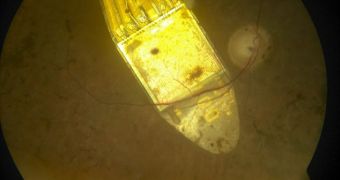According to a new research whose findings were published in the Royal Society's biological research journal Proceedings B, people who have lost their eyesight as a result of a degenerative disease might be able to see again with the help of a microchip implanted just behind their eyeballs.
Thus, said new report maintains that, after conducting a clinical trial on a total of nine patients suffering with blindness, a team of researchers working with Germany's Tubingen University have reached the conclusion that said microchip is quite successful in partially restoring these individuals' vision.
As the scientists in charge of carrying out this clinical trial explain, these people are all suffering with retinitis pigmentosa, an eye disease that basically consists in the patients' experiencing damage to their retina.
Needless to say, this translates into their losing their eyesight.
However, it seems that the patients fitted with this microchip soon managed to distinguish both facial expressions and objects, meaning that they got back some of their ability to see. Daily Mail reports that this 3 mm microchip is implanted just before the surface of the retina, and that its main function is that of electrically stimulating optical tissues.
By the looks of it, the microchip performed much better when placed in the eyeballs of these nine patients than it did during previous clinical trials.
Because of this, Professor Eberhart Zrenner, currently working with the Institute for Ophthalmic Research at the Tubingen University, went as far as to say that the results they got while carrying out this clinical trial “exceeded expectations.”
“As physicians we are constantly seeking out the best treatment options for our most in-need patients which most definitely includes those suffering from advanced-stage retinitis pigmentosa.”
“This research provides additional evidence our sub-retinal implant technology can help some patients with retinal degeneration regain functional vision and does so in a way that does not require externally visible equipment,” Professor Eberhart Zrenner went on to add.
Up until now, a total of 36 patients have been fitted with this microchip as part of several clinical trials, and researchers hope that soon enough this technology will become a legitimate way of dealing with retinitis pigmentosa.

 14 DAY TRIAL //
14 DAY TRIAL //